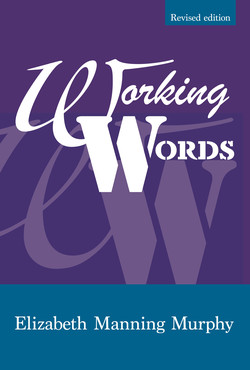Читать книгу Working Words - Elizabeth Manning Murphy - Страница 5
На сайте Литреса книга снята с продажи.
ОглавлениеPreface to the first edition
A lot has been written about English grammar, editing, plain English, effective writing, the business aspects of working from home as a freelance editor, writer and mentor, and so on. There are formal reference works on all of these topics, and this book does not seek to compete with any of them. Rather, it is a companion to all of them, to be picked up and dipped into at random for a somewhat lighter approach to these topics. It is dedicated to everyone who loves the English language and wants to make words work in their own writing and wants to help other writers to present their words to best effect.
I am a descriptive linguist – not a prescriptive grammarian. I have been editing as well as teaching, coaching and mentoring students of business English, academic writing and linguistics from a variety of cultures and language backgrounds since the 1970s. My work has included editing government, business and academic writing during this time. This has taught me that, while there are some conventions we need to follow in order to be understood, there are also new ideas, new technologies and changing fashions, all of which cause changes in those conventions and in the English language as a whole. I have, therefore, a flexible approach to the application of the ‘rules’ of English grammar in the workplace and in academic and other forms of writing. I tend to ‘go with the flow’. The words have to work. If they don’t, the whole document fails. Despite a grammar book’s insistence on a certain preposition with a certain adjective, for instance, it is clear that our living language will make today’s usage look ‘old hat’ in a few years, so it is often better to go for readability than to stick rigidly to a rule that was drawn up by prescriptive grammarians fifty or a hundred years ago.
Working words is based on the articles I wrote for the newsletter of the Canberra Society of Editors over a period of ten years. It is divided into eight parts, and the individual ‘chats’ (my word for chapters written in a chatty style) are grouped according to subject matter. The book first looks at what makes an editor and the craft of editing; and then some legal and ethical considerations. These are followed by the business side of working from home as an editor or writer. Several parts are devoted to aspects of English grammar, including some of the confusions that need demystifying, and punctuation. There’s a word or two about style in writing, and finally a look at what the future holds for communication in English. And there are some little surprise packages in between the parts which look at some of the oddities I have observed in the use of English as I’ve travelled – ‘itchypencils’.
ix My work these days is largely in editing, and this is a strong influence on the content and style of the chats. However, I hope the book will find a place, alongside the dictionaries and the more formal texts, on the bookshelves of editors, writers, teachers and anyone interested in making words work.
Acknowledgements
My first thanks go to the Canberra Society of Editors in whose newsletter, The Canberra editor, the originals of these chats appeared, for agreeing to my basing this book on those articles and for joining me in this adventure. And thanks to the Society for Editors and Proofreaders for interest in the project in the UK.
A book like Working words doesn’t just happen. My sincere gratitude goes to Ara Nalbandian, who has pulled together the material into themes and edited the resulting chats. Thanks also to the rest of the Canberra Society of Editors publication team: Cathy Nicoll, Edwin Briggs, Virginia Wilton, Martin Blaszczyk and Tracy Harwood; and a very big ‘thank you’ to Carina Manning, designer.
I also acknowledge the public authorities and others who put up the roadside and other signs that I had fun writing about as I travelled. I took all of the photographs in the book.
I couldn’t have done all this without the love and encouragement of my family and friends, in Australia and England, who put up with me in writing mode for many months. I appreciate everyone’s interest in the project. Special thanks are due to my sister Judy Angus for reading drafts.
Elizabeth Manning Murphy JP DE
Canberra, 2011
